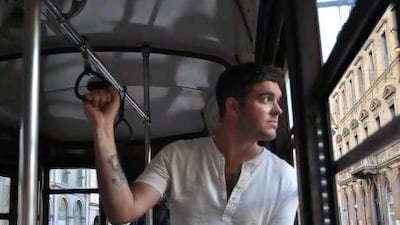As literary prizes go, this week's National Book Awards are among America's most prestigious and laudable - one of the aims is to "enhance the cultural value of good writing" in the US. What all this has to do with the rest of the world might be a moot point, particularly when recent years have seen the prize awarded to novels about horse racing in West Virginia and hurricanes in New Orleans.
But 2012's shortlist hints at a changing, less insular world view. Dave Eggers' A Hologram for the King is partly set in Saudi Arabia. Billy Lynn's Long Half Time Walk is a raucous depiction of the boorish Bravo Squad, back home from Iraq. And on similar, quietly devastating territory is The Yellow Birds by Kevin Powers, the story of Private John Bartle's experiences during and after the Gulf War.
And Powers should know about the effect war can have on the individual more than most. He was in Iraq himself, a US Army machine-gunner in Mosul and Tal Afar.
Understandably, his book is being read as a thinly veiled true-life tale, but Powers is less sure.
"I did want to tell the truth to the best of my ability," he admits. "But while my personal experience informed the book, the book itself is a work of the imagination. So it was more an issue of trying to ask the right questions about my experience and how to communicate the concerns I had. The lines were very clear: these characters and the things they go through all fall on the fictional side of that line."
The Yellow Birds certainly doesn't follow the traditional trajectory of an all-American war hero tale. We know from the very first chapter that a colleague, Private Murphy, will not make it. Bartle, meanwhile, battles with the senselessness of war, deadened by the role he has to play within it.
"In a way it's a story about someone who wanted to be good and failed," says Powers. "It made sense to reveal that failure up-front because the book is as much about the ramifications of failure as the situation itself. The fact that the danger doesn't end for a soldier simply because he leaves the battlefield was important to explore, I think."
And it's the lasting damage of war which makes The Yellow Birds so interesting for non-American readers. The attitudes of the trigger-happy soldiers in Iraq - particularly Bartle's Sergeant, Sterling - are often abhorrent and inhumane. But at the same time, Bartle despises who he is becoming. When he returns home, he says: "Really, they should all hate me for what I've done, but everyone loves me for it and it's driving me crazy." It's a breathtaking insight into the longer-term effects of battle.
"That's certainly something I wanted to articulate," agrees Powers. "There is a guilt that results from being in this situation. Sterling tries to separate his morality from his responsibility as a soldier and we see what I think is the inevitable result of doing that. So I hope that anyone who reads the book will see it as a story of one ordinary person trying to deal with extraordinary circumstances. I tried to present the totality of that experience, without excusing or placing blame."
In that sense, The Yellow Birds has more in common with some of the trench literature of the First World War. In fact, like Rupert Brooke, Wilfred Owen and Siegfried Sassoon, Powers is a poet. So Al Tafar past curfew is "vast and catacombed, its black alleys a tightly wound maze". Mortars have a narrow whine and huddled beggars scour rubbish heaps. Whether a young soldier would detail his heightened world in this way has been cause for some discussion in the otherwise positive reviews, but Powers believes it rings true.
"Well, there is a clinical strategy for people who have experienced trauma - in which they name the things around them to locate themselves in reality," argues Powers. "So for Bartle, there is this need to order and arrange his memories into a picture that he can make sense of. I wanted the language to match the intensity of that process, the way he is both lost inside his memories and that he attempts to use them to find his way out."
Thankfully, it appears Powers himself is a lot more comfortable with his own memories of Iraq.
"It's strange, I didn't have the goal of providing definitive answers to the questions I had when I started writing," he says. "My only goal when I began this book was to follow my curiosity and imagination to the best of my ability at the time. I think I did that."
The National Book Awards ceremony will be held tomorrow in New York City. Visit www.nationalbook.org for more details. The Yellow Birds by Kevin Powers (Sceptre) is out now.

